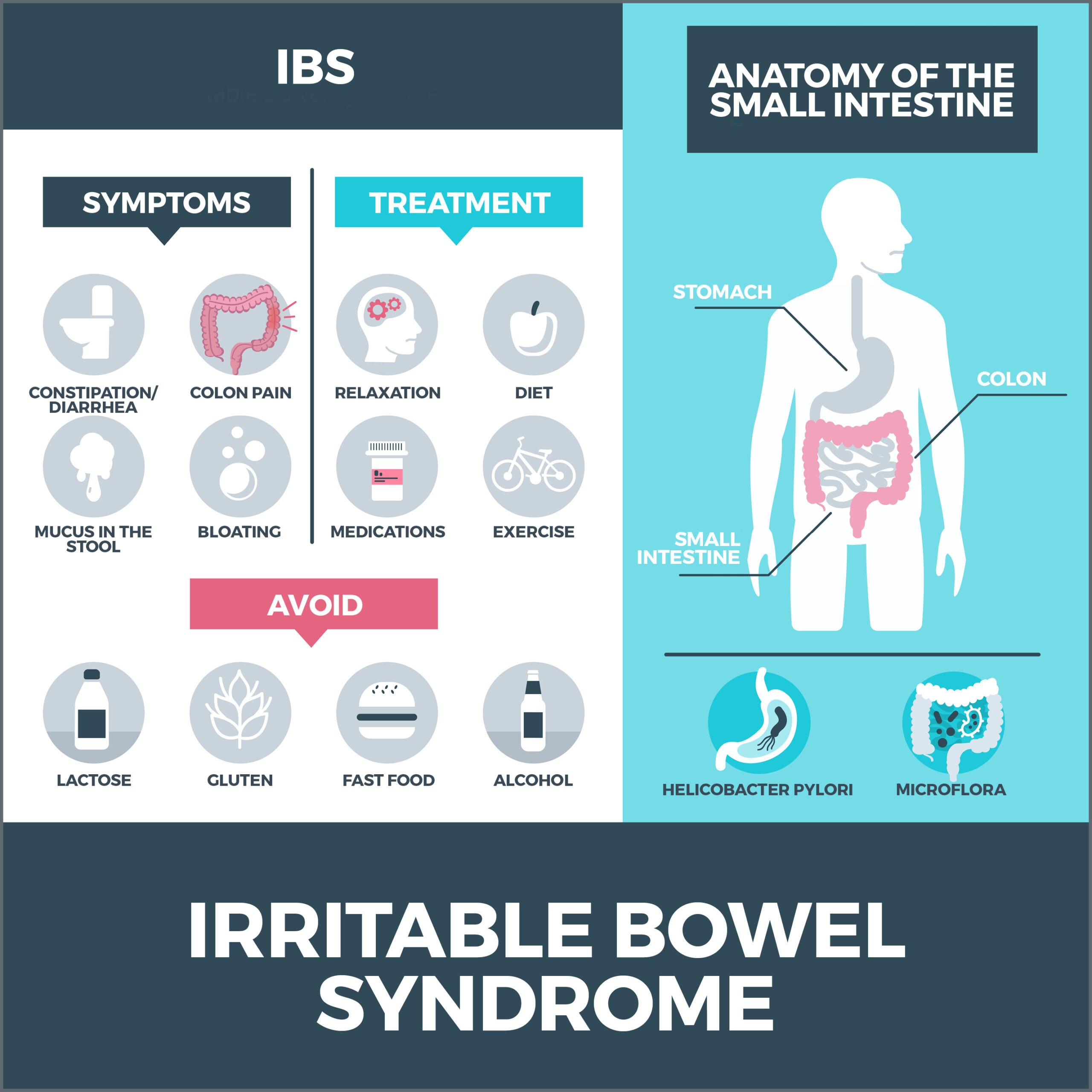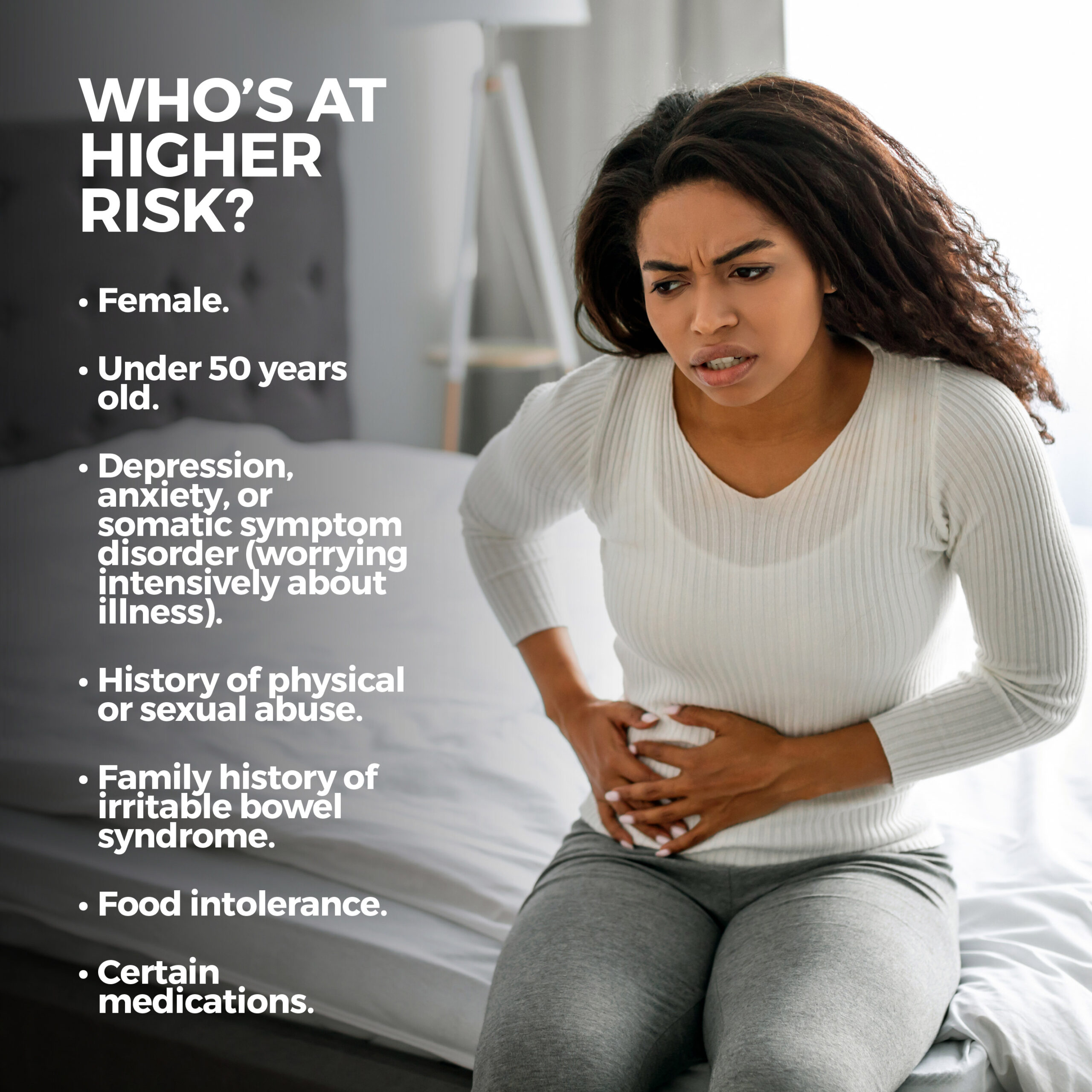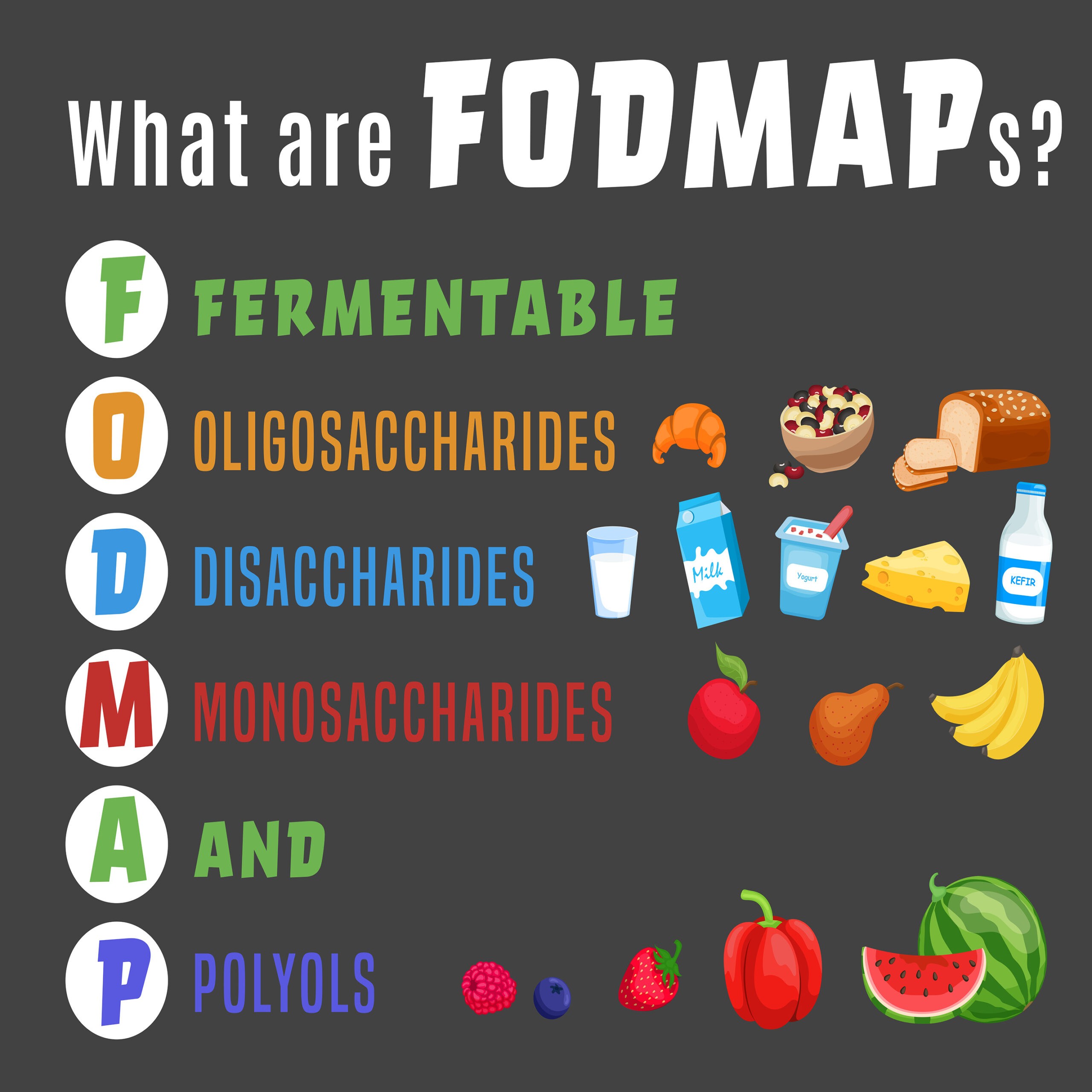
Irritable Bowel Syndrome
Irritable bowel syndrome, or IBS, is a gastrointestinal disorder that affects the large intestine. It is a group of intestinal symptoms that occur together and last approximately three days a month for three months, although this can vary from person to person.
Also called irritable colon, spastic colon, spastic colitis, or mucous colitis, IBS isn’t dangerous. It doesn’t increase susceptibility to serious conditions such as Crohn’s disease, ulcerative colitis, or colon cancer. But it can disrupt your activities, interrupt your work, and alter your lifestyle.

What Causes Irritable Bowel Syndrome?
There are a wide variety of things that can cause irritable bowel syndrome. These include:
Disrupted Brain-Gut Communication – A nerve center in the gut interacts with the brain and vice versa. When this communication is disrupted, it can make your gut sensitive when filled with gas or a bowel movement. Your body overreacts to normal digestion, triggering constipation, diarrhea, or pain.
Abnormal Intestinal Contractions – Intestinal muscles rhythmically contract as they transport food. Weak contractions delay food passage – producing dry, hard bowel movements. Contractions that are longer and stronger than usual can create bloating, gas, and diarrhea.
Infection – Intestinal infection, also called gastroenteritis, is caused by a virus or bacterial overgrowth and can lead to irritable bowel syndrome.
Gut Microbe Changes – Our intestines are home to beneficial fungi and bacteria crucial to good health. People with irritable bowel syndrome may have microbes that are different from healthy ones.
Who is at higher risk?
- Female.
- Under 50 years old.
- Depression, anxiety, or somatic symptom disorder (worrying intensively about illness).
- History of physical or sexual abuse.
- Family history of irritable bowel syndrome.
- Food intolerance.
Certain medications.

What Are the Symptoms of Irritable Bowel Syndrome?
People who have irritable bowel syndrome experience symptoms that may include:
- Constipation.
- Explosive diarrhea.
- Alternating constipation and diarrhea.
- Lower abdominal pain that worsens after meals and diminishes after having a bowel movement.
- Intense gas.
- Bloating.
- Hard stools.
- Loose stools.
- Mucous in your bowel movements.
- Heartburn and indigestion.
How Is Irritable Bowel Syndrome Diagnosed?
Doctors diagnose IBS by analyzing your symptoms and determining whether they follow certain patterns. These include pain in your belly and two more of these symptoms:
- Pain that improves or worsens after a bowel movement.
- A change in the frequency of your bowel movements.
- A change in your stools’ appearance.
- Symptoms that have occurred once a week in the past three weeks and started six or more months ago.
Your doctor may also conduct tests for health problems that mimic irritable bowel syndrome, including:
- Stool Test – This test rules out diseases, infections, or parasites. It also analyzes whether your intestine is struggling to absorb nutrients from food.
- Blood Test – Blood tests rule out anemia, thyroid problems, or celiac disease (an autoimmune reaction to eating gluten).
- Colonoscopy – A colonoscopy (a test that allows your doctor to examine your rectum and colon) is performed to rule out Crohn’s disease, colitis, or cancer.
- Upper Endoscopy – An upper endoscopy (a procedure to view your upper digestive tract) is conducted if you have indigestion or heartburn. If necessary, a tissue sample can also be collected during an upper endoscopy. An upper endoscopy:
- Tests to rule out pancreatic enzyme deficiency.
- Tests to determine if you have bowel muscle problems.
- Barium Test (lower GI series) – This test involves filling your large intestine with liquid barium, which helps abnormalities become more visible in x-rays.
- Lactose Intolerance Tests – If you don’t produce lactase, an enzyme that digests sugar in dairy products, you may have symptoms that mimic irritable bowel syndrome. In this case, you may be asked to abstain from dairy for several weeks or take a breath test.
- Breath Test – This test can determine whether you have excess bacteria in your small intestine. People who have had bowel surgery or diabetes, which slow down digestion, may have symptoms like IBS.
Are There More Than One Type of Irritable Bowel Syndrome?
Yes, there are four types of IBS:
- IBS-C – This is IBS with constipation.
- IBS-D – This is IBS with diarrhea.
- Mixed IBS (IBS-M) – This type of IBS alternates between constipation and diarrhea.
- Unsubtyped IBS (IBS-U) – This category describes anyone who doesn’t fit any of the above descriptions. Less than a quarter of their stools are lumpy or hard, and less than a quarter of them are watery or loose.
Irritable Bowel Syndrome Remedies
There are several lifestyle and dietary changes that can reduce IBS symptoms. These include:
- Add soluble fiber to your diet. Foods such as whole grains, fruits, and vegetables are good choices. The ideal amount of fiber is 25 grams a day for women and 38 grams a day for men.
- Don’t eat hot and cold foods simultaneously, such as ice water and a piping hot bowl of stew.
- Stop smoking.
- Don’t chew gum.
- Exercise at least 30 minutes a day.
- Eliminate alcohol.
- Avoid caffeine in food and drinks such as coffee, soda, dark chocolate, and protein bars.
- Eliminate sugar-free sweeteners.
- Don’t eat spicy foods.
- Drink eight eight-ounce glasses of unflavored, uncarbonated water daily. This is called the Eight x Eight Rule.
- Eat smaller meals more often, instead of three big meals.
- Eat smaller portions.
- Eat meals slowly.
- If you’re prone to diarrhea, avoid foods that contain sorbitol, a sugar alcohol that’s found in fruits such as strawberries, apricots, and cherries. Dried fruit, including raisins, figs, and prunes, can also contain sorbitol. However, moderate amounts of sorbitol can provide relief if you suffer from constipation.
Limit milk and milk products. - Avoid other gas-inducing foods such as peppers, onions, garlic, fried foods, processed foods, broccoli, cabbage, and cauliflower.
Eliminate beverages that can cause excessive gas and bloating, such as carbonated drinks. - Stop eating gluten. Gluten is a protein found in grains, including wheat, barley, and rye. Most crackers, pasta, pastries, cookies, soy sauce, and salad dressings contain gluten. Ask your doctor for a list, as many products contain gluten.
FODMAP is an acronym for certain IBS-triggering carbohydrates that are indigestible or inadequately absorbed. Working with a doctor or dietician, you stop eating specific foods and then reintroduce them to determine which ones provoke your IBS. This way, you know exactly what you can and can’t eat.

Various things can also be used to combat IBS:
- Antibiotics – By changing the amount of bacteria in your intestines, antibiotics such as Xifaxan can relieve IBS symptoms for up to six months.
- Probiotics – “Good” bacteria (flora) live in your gut and aid normal digestion. When these florae become unbalanced, they can trigger IBS flare-ups. Probiotic supplements can reduce inflammation, slow down the digestive tract, and hinder bacterial overgrowth.
- Bulking treatments – These treatments relieve constipation by bulking up your bowel movement so that it can travel more easily through your intestines. They also increase the water in your stool to soften it and help it pass more easily. Psyllium (Metamucil) is commonly used for this treatment.
- Antidepressants – Different antidepressants have different effects on irritable bowel syndrome. Tricyclic antidepressants such as Imipramine, Amitriptyline, and Doxepin ease diarrhea, while selective serotonin reuptake inhibitors (SSRIs) such as Paxil, Zoloft, and Prozac may relieve constipation. Another advantage to taking antidepressants is that they can help with IBS-related depression.
- Imodium – Imodium is an over-the-counter medication that relieves diarrhea by reducing your gut’s movement.
- Laxatives – Over-the-counter laxatives such as Phillips’ Milk of Magnesia or Miralax may help constipation.
- Bile Acid Sequestrants – Bile acid is a substance produced by the liver that helps break down fats. As part of normal digestion, bile acids pass through the large intestine and the small bowel and are reabsorbed into the bloodstream. When they aren’t reabsorbed, too much salt and liquids accumulate in the large bowel, causing diarrhea. Bile acid sequestrants such as Prevalite, Colestid, and Questran are medications that bind to bile acids and are eliminated in the stool.
When Should You Call Your Gastroenterologist?
If you have any of these symptoms, it can indicate a serious problem. Call your doctor if you have:
- Excessive, unexplained weight loss.
- Infection or fever.
- Severe diarrhea.
- Intense abdominal pain unrelated to a bowel movement.
- Severe dehydration.
- Rectal bleeding.
- Fever.
Does IBS Have Complications?
Although irritable bowel syndrome can have complications, none are life-threatening. IBS can cause malnourishment and hemorrhoids.
When you cut out certain foods to manage your irritable bowel syndrome, you may experience nutrient deficiency. Hemorrhoids are swollen blood vessels around your anus that can be painful and bleed. Over-the-counter treatments such as Preparation H, petroleum jelly, and aloe vera can soothe the area.
Contact Us
Living with irritable bowel syndrome can be frustrating and challenging. Bloating, gas, diarrhea, constipation, and pain can prevent you from living life to the fullest. If your symptoms aren’t going away or diminishing, please give us a call today.
The team of professionals at GastroMD looks forward to working with you. We are one of the leading gastroenterology practices in the Tampa Bay area. We perform a host of diagnostic procedures using state-of-the-art equipment in a friendly, comfortable, and inviting atmosphere where patient care is always a top priority.



